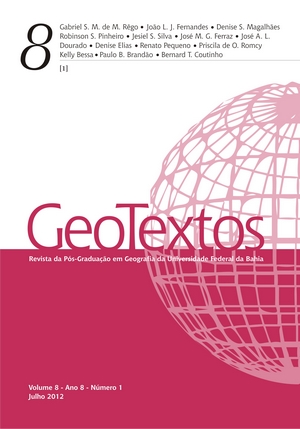LAND ISSUE: THE LAND AS A SOCIAL AND ECONOMIC NEED FOR THE QUILOMBOLA REPRODUCTION
DOI:
https://doi.org/10.9771/1984-5537geo.v8i1.5517Keywords:
Maroon communities, Resistance, Land regulationAbstract
The maroon communities keep alive, even today, centenary practices brought by their ancestors from Africa. These practices, besides cultural, relate to the religiosity , politics and forms of production, involving agricultural techniques, forms of soil management, planting forms, becoming in an intimate relationship of these communities with the environment in which they are inserted, starting from the development of conservationist techniques and rational use of natural resources, thus ensuring the maintenance of biodiversity for the benefit of future generations. Their achievements had passed automatically for a period of democratization of the country in which the black movement and leaderships of Quilombolas communities had intensified the fight for rights that would guarantee citizenship to these communities. The aim of this paper is to analyze the achievements that occurred from these movements that ensured the beginning of their rights when involved in the process of elaboration of the Constitution of 1988, they ensured the right to preserve their identity and culture, as well as the right of title deed of occupied lands by several years by a people who was opposed to the slave regime and formed a new model of society and social relations.Downloads
Downloads
Published
How to Cite
Issue
Section
License
Autores que publicam nesta revista concordam com os seguintes termos:
Autores mantém os direitos autorais e concedem à revista o direito de primeira publicação, com o artigo simultaneamente licenciado sob a Licença Creative Commons Creative Commons CC BY que permite o compartilhamento do trabalho com reconhecimento da autoria e publicação inicial nesta revista. Esta licença permite que outros distribuam, remixem, adaptem e criem a partir do seu trabalho, mesmo para fins comerciais, desde que lhe atribuam o devido crédito pela criação original. É a licença mais flexível de todas as licenças disponíveis. É recomendada para maximizar a disseminação e uso dos materiais licenciados. Ver o resumo da licença em: https://creativecommons.org/licenses/by/4.0/ Ver o texto legal da licença em: https://creativecommons.org/licenses/by/4.0/ Consulte o site do Creative Commons: https://creativecommons.org/licenses/?lang=pt
Autores têm autorização para assumir contratos adicionais separadamente, para distribuição não-exclusiva da versão do trabalho publicada nesta revista (ex.: publicar em repositório institucional ou como capítulo de livro), com reconhecimento de autoria e publicação inicial nesta revista.
Autores têm permissão e são estimulados a publicar e distribuir seu trabalho online (ex.: em repositórios institucionais ou na sua página pessoal) a qualquer ponto antes ou durante o processo editorial, já que isso pode gerar alterações produtivas, bem como aumentar o impacto e a citação do trabalho publicado (Veja O Efeito do Acesso Livre).






